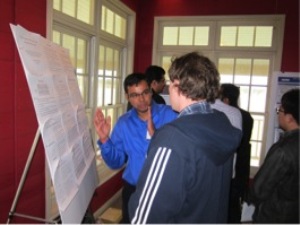Mar 25 2013
The Computer Engineering and Systems Group (CESG) from the Department of Electrical and Computer Engineering initiated the inaugural Texas Workshop on Integrated System Exploration (TexasWISE), which was designed to promote interactions between integrated circuits/systems faculty and industry members.
 Texas Workshop on Integrated System Exploration
Texas Workshop on Integrated System Exploration
The workshop was conducted March 8 at the historical Winedale House in Round Top, Texas.
The mission of the meeting was to promote interactions between integrated circuits/systems faculty, as well industry practitioners with their counterparts in other fields, and therefore help to find new inter\disciplinary research directions. Texas A&M's Dr. Jiang Hu led the coordination across the participating organizations of the workshop. Dr. Sunil Khatri, also from Texas A&M, organized the poster session of the workshop.
The workshop featured talks by four eminent scholars. Dr. Srinivas Devadas of the Massachusetts Institute of Technology discussed new approaches for cybersecurity and their corresponding computer architectures and implementations, along with a discussion on challenges in this area. Dr. Philip Wong of Stanford University presented the latest progress on semiconductor device technology, such as logic switches, made with carbon nanotubes. He also described the novel use of nanoscale memory devices to emulate biological brains. Dr. Lin Zhong of Rice University described recent trends in mobile systems, including hardware heterogeneity, and techniques/opportunities in this field. Dr. Roozbeh Jafari of the University of Texas at Dallas focused his talk on how to leverage wireless electronics to facilitate ubiquitous health systems.
The workshop also included a student poster session, whcih included 27 posters presented by students from Texas A&M, Rice University, University of Texas at Austin, University of Texas at Dallas, and University of Alabama at Birmingham. The posters covered a wide range of research activities, including GPU computing, coding for phase change memory, lithography-friendly circuit layout and neuromorphic VLSI architectures. Nearly 100 people attended the workshop from both industry and educational facilities in Texas such as the University of Texas at San Antonio, Prairie View A&M University, Intel, AMD and Freescale Semiconductor. They expressed a mutual interest in TexasWISE continuing every year because of the importance of discussing the progress of integrated circuits and systems.
Integrated circuits and systems have seen spectacular advances in the past decades and provided the essential foundations for the broader high-tech industry. While continuing to seek ways to advance Moore's law, there is also a compelling need to search for new growth directions, and to further broaden the significant impact of integrated circuits/systems in society.
Which growth directions to pursue is a topic of a rich debate, and it is the goal of TexasWISE to enable this debate among Texas researchers and industry practitioners. Towards this goal, the CESG believed that a direct interaction among experts in different areas would render a big help.